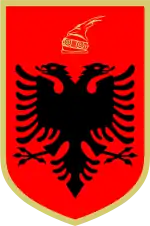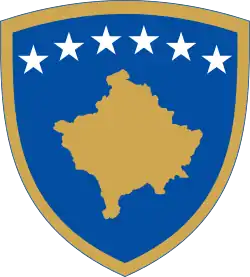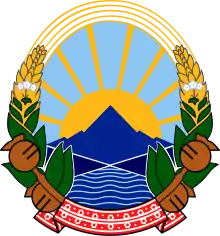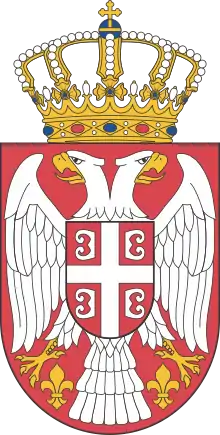Mini-Schengen area
The "mini-Schengen" area is an economic zone between Serbia, Albania, North Macedonia and Kosovo.[lower-alpha 1] The plans for it were announced in 2019. The nickname refers to the Schengen Area, the free economic zone that includes many major European countries but not the aforementioned Balkan countries.
Mini-Schengen area | |
|---|---|
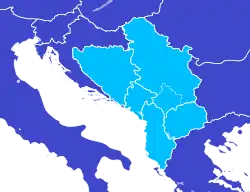 Potential maximum area | |
| Type | Economic area |
| Membership |
|
The plans for the area were declared on 10 October 2019 in Novi Sad. Two more meetings were held, one in Ohrid on 11 November 2019 and the other in Durrës on 12 December 2019. These countries declared that they will form a unified market of 14 million people by the end of 2020. With this Union, goods and capital between these countries will flow quicker, people from these countries will be able to cross the border with ID only, and more than 30 million hours will be saved crossing the borders of these four countries every year. On 4 September 2020 Kosovo agreed to join the Mini Schengen Area as part of the 2020 Kosovo–Serbia agreement.[1] The World Bank says that this project would save 3.2 billion USD, of which, the Serbian president said, Serbia gets at least 1.5 billion. The zone was proclamed on 9th November 2020. This economic zone is preparing the countries to become members of the European Union.[2][3]
Purpose
The Mini Schengen Area's intentions are to provide greater opportunities for trade, student exchanges, and encourage EU integration in the member states, inter alia. Citizens of member states will need only a ID card to visit other member states, saving time at border crossings.
History
Background
The first mentions of an economic area between these countries came in the early 1990s. The plans were eventually abandoned due to the 1999 NATO bombing of Yugoslavia, a 1999–2001 insurgency in southern Serbia and eastern Kosovo and a 2001 insurgency in Macedonia. The first signs of the Mini Schengen Zone emerged in 2018, but it was initially planned as a way to improve political relations. However, at the 2019 Ohrid summit, the presidents of Serbia, Albania and North Macedonia agreed to create an economic zone, which would further improve political and economic relations and strengthen cultural ties between the nations.
Timing
On 10 October 2019 the Mini Schengen Zone was declared by Serbia, Albania and North Macedonia. The next meeting was projected to be in Belgrade, in late spring or summer 2020. The first meeting was due to be held in January or February 2020 in Belgrade. However, due to the COVID-19 pandemic, no meeting was held and a potential date for new meeting in Belgrade was tentatively scheduled for spring or summer 2020. At that meeting the leaders of the four countries will give further details on the Zone. In the joint declaration of October 2019, Serbia, Albania, and North Macedonia guaranteed that, by the end of 2020, they will create the Mini Schengen Area, ensure the free flow of goods and capital, and ensure unified border crossing procedures.
First challenges
During the COVID-19 pandemic, the economies of the involved countries were hit hard. However, Serbia, Albania and North Macedonia managed to be the least hit countries in Europe. The European Union has seen this potential for cooperation and has opened negotiations with Albania and North Macedonia. The countries of the European Union, China, Russia, and several other countries helped the countries to recover from the COVID pandemic.
Potential members
Two potential members are Montenegro and Bosnia and Herzegovina. The President of Montenegro said that he supports the Durrës summit, but Montenegro is focused on joining the European Union. A representative of Bosnia and Herzegovina said during the Ohrid summit that Bosnia and Herzegovina is likewise currently focused on joining the European Union.
Statistics and data
Economy and cities
The GDP of these countries combined would be $79.613 billion, GDP PPP would be $211.971 billion. GDP per capita would be $6,694, GDP PPP per capita would be $17,700. Albania, Kosovo and North Macedonia would have higher GDP per capita and GDP PPP per capita, and Serbia's GDP/GDP PPP per capita would decrease somewhat. The current currencies are the Serbian Dinar, Albanian Lek, Macedonian Denar and the Euro. The official languages are Serbian, Albanian and Macedonian. The capital cities are Belgrade, Tirana, Pristina and Skopje. Some other big cities are Novi Sad, Nis, Durrës, Shkodra, and Kragujevac. Serbia is the largest country in this Union. Serbia also has the largest economy, highest Human Development Index, and largest population. The largest city in this Economic Zone is Belgrade, with about 1.7 milion people.
Economy of member states

 Serbia
Serbia
- GDP: $58.333 billion
- GDP PPP: $140.878 bilion
- GDP per capita: $8.444
- GDP PPP per capita: $20.392
- GDP growth: -1.1%(2020),6.0%(2021)
- Inflation: 1.2%(2020)
 Albania
Albania
- GDP: $15.418 bilion
- GDP PPP: $40.151 bilion
- GDP per capita: $5.373
- GDP PPP per capita: $13.991
- GDP Growth: -5%(2020),8.0%(2021)
- Inflation: 2.0%(2020)
 North Macedonia
North Macedonia
- GDP: $12.672 bilion
- GDP PPP: $34.694
- GDP per capita: $6.096
- GDP PPP per capita: $16.486
- GDP growth: -4%(2020),7.0%(2021)
- Inflation: -0.9%(2020)
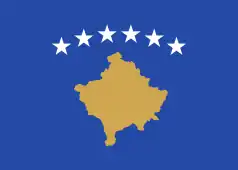 Kosovo
Kosovo
- GDP: $7.996 bilion
- GDP PPP: $22.128
- GDP per capita: $4.442
- GDP PPP per capita: $12.432
- GDP growth: -5%(2020),7.5%(2021)
- Inflation: 1.3%(2020)
Population
 Serbia
Serbia- 6,945,235 (2019)
 Albania
Albania- 2,845,955 (2020)
 North Macedonia
North Macedonia- 2,077,132 (2019)
 Kosovo
Kosovo- 1,873,160 (2020)
Notes
- Kosovo is the subject of a territorial dispute between the Republic of Kosovo and the Republic of Serbia. The Republic of Kosovo unilaterally declared independence on 17 February 2008. Serbia continues to claim it as part of its own sovereign territory. The two governments began to normalise relations in 2013, as part of the 2013 Brussels Agreement. Kosovo is currently recognized as an independent state by 98 out of the 193 United Nations member states. In total, 113 UN member states recognized Kosovo at some point, of which 15 later withdrew their recognition.
References
- "Šta piše u sporazumu Kosova i Srbije?". Radio Slobodna Evropa (in Serbo-Croatian).
- Simić, Julija (2019-10-11). "Three countries agree mini Schengen in the Balkans". www.euractiv.com. Retrieved 2020-04-25.
- Holroyd, Matthew (2019-11-11). "Western Balkan leaders plot their own 'mini-Schengen' zone". euronews. Retrieved 2020-04-25.
